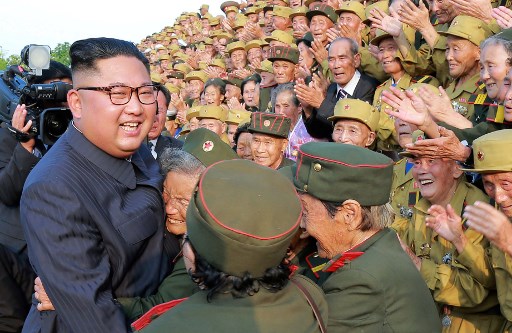
Meanwhile, a US military aircraft carrying the remains of US Korean War dead collected in North Korea arrived in the South on July 27, the 65th anniversary of the armistice that ended the fighting. / AFP PHOTO
by Sebastien BERGER
Agence France Presse
PYONGYANG, North Korea (AFP) — In mist-covered hills, North Korean soldiers, sailors, and civilians gathered Friday at a heroes’ cemetery to commemorate their brothers in arms on the anniversary of the end of the Korean War.
Hostilities between the US-led United Nations forces and the North Koreans and their Chinese allies ceased 65 years ago with an armistice rather than a peace treaty, leaving the peninsula technically still in a state of conflict.
The two sides had fought each other to a standstill, millions were dead and Korea was a divided, war-ravaged ruin but the North’s self-proclaimed victory has long constituted a key plank of the Kim dynasty’s right to rule.
Platoon by platoon, units gathered at the graveyard on the outskirts of Pyongyang dominated by a towering sculpture of a rifle muzzle and bayonet, and adorned with the medal of a Hero of the Democratic People’s Republic of Korea, the North’s official name.
They laid flowers before an oversized granite coffin, draped in a metal flag and topped with a submachine gun and cap.
An announcer intoned: “Let us bow before the martyrs who took part in the Great Fatherland Liberation War” — Pyongyang’s name for the conflict — before the troops doffed caps and bowed.
According to official North Korean accounts, the first of the cemetery’s occupants to die, Jang Thae Hwa, 22, blocked a pillbox opening with his chest one day after the North invaded the South in 1950 so that his unit could advance.
Pyongyang’s histories say the last soldier killed in the conflict to be laid to rest at the site was Ri Hyon Jun, 20, a ground gunner who was made a Hero of the DPRK for shooting down four enemy aircraft, and died in a later engagement just five days before the fighting ended.
Ceremonies complete, the soldiers strolled between the rows of graves, arranged chronologically in order of time of death.
At the same time on the other side of the country, remains believed to be those of American servicemen killed in the war were being loaded onto a US aircraft for transportation to the South, in the first stage of their final journey home.
‘Shining victory’
Relations between nuclear-armed Pyongyang and Washington have undergone an astonishing turnaround in recent months.
After exchanging personal insults and threats of war last year as tensions mounted, the North’s leader Kim Jong Un and US President Donald Trump shook hands at an unprecedented summit in Singapore last month.
The return of the US remains was part of their agreement.
But whether the North is willing to give up the nuclear arsenal which it has spent decades developing, and at a cost of multiple sets of UN Security Council sanctions, remains unclear.
In the Singapore statement, Kim pledged to work towards de-nuclearization of the Korean peninsula, a vague term open to interpretation on both sides, and there have been no subsequent confirmed moves by Pyongyang — which has condemned US demands for its unilateral disarmament as “gangster-like”.
But it is looking to develop its impoverished economy and authorities are seeking to ensure that the newfound bonhomie endures.
Unlike previous commemorations, AFP was not allowed to interview participants at the cemetery, or at Mansu hill, where attendees laid flowers before the giant statues of Kim’s predecessors, his father and grandfather Kim Jong Il and Kim Il Sung that look out over Pyongyang.
Diplomats in the capital say that meetings with government officials are even harder to secure than usual.
And propaganda posters focus on the heroism of the North’s troops, rather than condemning –- or even naming -– the enemy.
At a national conference of war veterans on Thursday, politburo presidium member Choe Ryong Hae focussed on the “shining victory of the Juche-oriented military idea, strategy and tactics and outstanding commanding art of Kim Il Sung”.
This was in marked contrast to last year’s anniversary when state media repeatedly referred to “the US imperialist aggressors” and newspapers proclaimed that the North would inevitably triumph over its longstanding enemy.
“Still not coming to its senses, the US is persisting in the hopeless confrontation with the DPRK, plunging itself deeper into the abyss of ruin,” read a commentary widely carried on July 27, 2017.
The following day Pyongyang carried out its second launch of a Hwasong-14 intercontinental ballistic missile.
© Agence France-Presse








